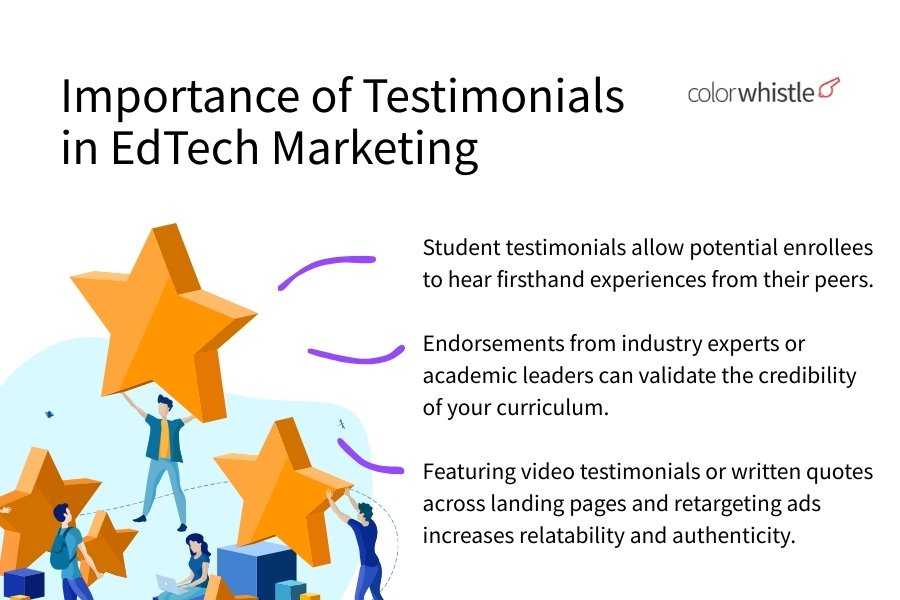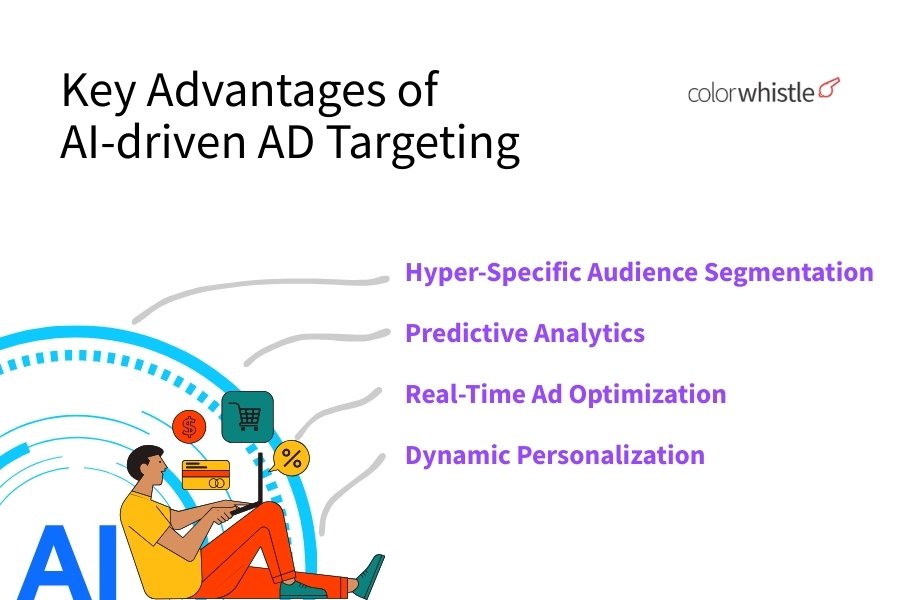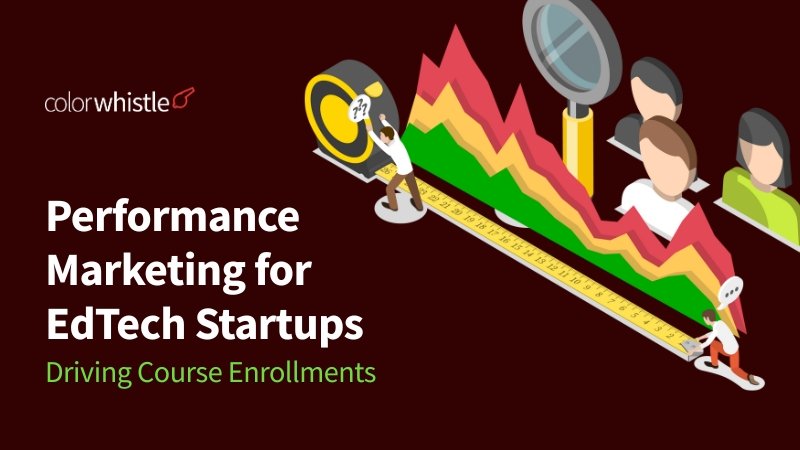The EdTech industry has seen rapid growth, driven by the increasing demand for online learning and digital education solutions. For startups in this sector, driving course enrollments is crucial to achieving sustainable growth and standing out in a competitive market. Traditional marketing methods often fall short in effectively reaching and converting prospective students.
Key takeaway: Performance marketing is a powerful tool that can help EdTech startups achieve their enrollment goals more effectively and efficiently. By leveraging data-driven strategies and targeted campaigns, startups can optimize their marketing efforts to attract high-intent learners and maximize conversions.
Understanding Performance Marketing in the Context of EdTech
Performance marketing is a results-oriented approach where digital campaigns are optimized and measured based on specific actions, such as clicks, leads, or enrollments, rather than just impressions or reach. Unlike traditional branding efforts, this model ties every dollar spent to quantifiable outcomes. For EdTech startups aiming to scale efficiently, performance marketing offers a direct path to track ROI and pivot strategies quickly.
The Relevance of Performance Marketing for EdTech
1. Precise Targeting
EdTech products often cater to niche audiences, students of specific age groups, professionals seeking upskilling, or lifelong learners. Performance marketing platforms enable hyper-specific targeting by interests, search behavior, demographics, and intent signals. This aspect of precision marketing is particularly beneficial for reaching the right audience effectively.
2. Measurable Growth
Startups can attribute signups and course purchases directly to particular ads or channels. This transparency supports agile budget allocation and rapid scaling of successful tactics.
Also Read
Challenges with Traditional Marketing in EdTech
EdTech industry nuances create obstacles when relying solely on conventional marketing methods:
Longer Consideration Cycles: Prospective students and parents often require extensive research before committing to a course. Standard ads may lack the nurturing needed to convert these high-investment decisions.
Intangible Product Value: Unlike physical goods, online courses are experiential. Demonstrating tangible outcomes is difficult through basic ads or offline promotions.
Intense Competition: With thousands of platforms vying for attention, generic awareness campaigns rarely cut through the noise.
However, performance marketing addresses these hurdles by providing tools for precise audience segmentation, continuous optimization, and clear measurement, empowering EdTech startups to drive meaningful engagement and sustained enrollment growth. This results-oriented approach not only enhances digital campaign effectiveness but also ensures that every dollar spent is tied to measurable outcomes.
To fully leverage the benefits of performance marketing in the EdTech sector, it’s crucial to adopt a comprehensive [digital marketing strategy](https://colorwhistle.com/services/digital-marketing) that encompasses various channels such as SEO, PPC, and SMO among others.
1. Leveraging Digital Marketing Channels
Digital marketing channels serve as the backbone of scalable and measurable enrollment strategies for EdTech startups. Two of the most impactful tactics are SEO for edtech courses and targeted Google Ads campaigns.
SEO for EdTech Courses
Enhancing course visibility on search engine results pages (SERPs) starts with robust SEO practices tailored to educational content. Key actions include:
- Keyword Research: Identify search terms prospective learners use, such as “best AI course online” or “Python programming certification.”
- On-Page Optimization: Craft compelling meta titles, descriptions, and structured data that clearly articulate course benefits and outcomes.
- Content Strategy: Develop long-form guides, FAQs, and resource hubs addressing learner pain points and optimizing for informational queries.
- Technical SEO: Ensure fast load times, mobile responsiveness, and accessible site architecture to support both users and search engines.
These measures help capture high-intent traffic from learners actively searching for courses. To further enhance these efforts, White Label SEO can be a strategic approach. This method allows EdTech startups to leverage expert SEO services while focusing on their core business functions.
Google Ads Targeting Strategies
Paid acquisition accelerates visibility by placing EdTech offerings in front of well-defined audiences. Effective Google Ads strategies include:
- Demographic & Interest Targeting: Refine ad delivery based on age, education level, geographic region, or specific interests like “data science” or “career advancement.”
- Custom Intent Audiences: Build audiences around users displaying purchase intent through recent searches or website visits.
- Compelling Ad Copy & Extensions: Use clear value propositions, limited-time offers, and callout extensions to drive clicks.
- Conversion Tracking: Set up pixel tracking to monitor sign-ups and optimize campaigns for cost-per-enrollment rather than generic click metrics.
Integrated use of SEO and Google Ads enables EdTech startups to meet potential students wherever they are in their decision journey, whether browsing organically or responding to a tailored ad. For those looking to build a strong online presence, partnering with a reliable web development company could be beneficial as they offer comprehensive digital marketing services tailored to the needs of EdTech startups.
2. Harnessing the Power of Content Marketing
Creating valuable educational content is essential for building credibility and driving organic traffic. EdTech startups can establish themselves as thought leaders by producing high-quality blog posts, tutorials, and articles that address the needs and pain points of their target audience. This strategy not only enhances SEO but also fosters trust among potential students.
Key Strategies to Leverage Content Marketing:
Educational Content Creation: Develop comprehensive guides, whitepapers, and case studies that offer in-depth analysis and insights into various subjects. This positions your platform as a reliable source of information.
Video Marketing for Online Courses: Utilize engaging video marketing strategies to effectively demonstrate course offerings. Create introductory videos, course previews, and testimonials from past students to showcase the value of your courses visually.
EdTech startups should also focus on integrating multimedia elements such as infographics and interactive content to keep learners engaged. These tools can simplify complex concepts, making them more digestible for students.
High-quality content acts as a magnet for inbound marketing efforts, attracting visitors who are genuinely interested in learning more about your offerings. By investing in educational content creation and leveraging video marketing for online courses, EdTech startups can significantly boost their enrollment rates through performance marketing strategies.
3. Data-Driven Decision Making for Optimal Results
Performance marketing thrives on actionable insights, not assumptions. EdTech startups can use analytics tools to understand user behavior and improve every part of the enrollment process. Tools like Google Analytics, Mixpanel, and Amplitude enable teams to:
- Track how users navigate from clicking on an ad to signing up for a course
- Identify where users drop off during onboarding or checkout processes
- Evaluate which types of content, marketing channels, and creative assets generate the most interest or conversions
By knowing what motivates learners to sign up, and where potential students lose interest, startups can use data to improve their marketing campaigns and enhance the overall product experience.
A structured framework for tracking key performance indicators (KPIs) is crucial for ensuring that marketing efforts align with enrollment goals. For EdTech startups, important KPIs may include:
- Cost per Enrollment (CPE): The cost associated with acquiring a new student
- Lead-to-Enrollee Conversion Rate: The percentage of leads who complete the registration process
- Lifetime Value (LTV) of Students: The extent to which courses foster long-term relationships with students
- Engagement Metrics: Measures such as time spent on course landing pages, completion rates of demo videos, or downloads of resources
By consistently tracking these metrics, startups gain a clearer understanding of what drives sustainable growth. This analytical approach ensures that resources are allocated towards strategies that have a proven impact on enrollments, paving the way for more personalized and effective student engagement initiatives.
4. Personalization Strategies to Enhance Student Engagement
Personalized learning experiences in EdTech have become a cornerstone for boosting both engagement and retention. When students interact with course content tailored to their skill level, interests, or career aspirations, participation rates soar. Adaptive learning platforms now leverage real-time data to recommend lessons, assignments, or resources best suited for each learner’s pace and goals. For example:
Skill-based pathing: Platforms may use diagnostic quizzes to assess baseline knowledge and dynamically adjust module difficulty.
Interest-driven content curation: Learners interested in specific tech stacks (e.g., Python vs. Java) receive project assignments and reading materials aligned with their preferences.
Delivering this degree of personalization extends beyond the course interface. Email segmentation techniques play a crucial role in nurturing leads and current users. By segmenting email lists based on user behavior, such as downloaded syllabi, past enrollments, or expressed academic interests, EdTech startups can send highly relevant content that resonates with each recipient:
- Targeted reminders about enrollment deadlines for courses previously viewed.
- Curated recommendations highlighting new modules that match a learner’s demographic profile or previous study paths.
- Re-engagement campaigns addressing students who paused progress or abandoned sign-up flows.
These strategies ensure communications feel personal rather than generic, increasing the likelihood of both initial enrollments and sustained course completion.
5. Building Trust and Credibility Through Social Proof
Driving Course Enrollments through Performance Marketing for EdTech Startups hinges on more than just strong ad campaigns, it requires clear evidence that your courses deliver real outcomes. Social proof, including testimonials and case studies, serves as a powerful trust-builder in the decision-making process for prospective learners.
Importance of Testimonials in EdTech Marketing

- Student testimonials allow potential enrollees to hear firsthand experiences from their peers, addressing common concerns such as course difficulty, ROI, and support quality.
- Endorsements from industry experts or academic leaders can validate the credibility of your curriculum, distinguishing your startup from competitors.
- Featuring video testimonials or written quotes across landing pages and retargeting ads increases relatability and authenticity.
Case Studies Showcasing Successful Student Outcomes
- In-depth case studies highlight measurable successes, such as career transitions, promotions, or academic achievements, demonstrating the practical value of your offerings.
- Narratives that detail a learner’s journey, challenges faced, and how specific course features contributed to their success make abstract benefits tangible.
- Visual elements like before/after stats or progression timelines help illustrate impact at a glance.
“I landed my first data analyst role within three months of completing [Course Name]. The hands-on projects mirrored real workplace scenarios and gave me confidence during interviews.”, Recent Graduate Testimonial
Integrating these elements throughout your marketing funnels reassures prospective students that your courses have delivered results for others, laying the groundwork for higher enrollment rates.
6. Aligning Sales and Marketing Efforts for Seamless Lead Conversion
Effective collaboration between sales teams and marketers in EdTech companies is crucial for driving course enrollments. This synergy ensures that both departments work towards a common goal, converting leads into enrolled students.
Strategies to Foster Collaboration:
- Shared Goals and Metrics: Establishing shared objectives and metrics allows both sales and marketing teams to align their efforts. Metrics such as lead conversion rates, enrollment numbers, and campaign ROI can help measure success collectively.
- Regular Communication: Regular meetings and updates between sales and marketing teams facilitate the exchange of insights and feedback. This communication helps refine strategies, address challenges promptly, and optimize performance marketing campaigns.
- Integrated CRM Systems: Utilizing integrated Customer Relationship Management (CRM) systems enables seamless data sharing between departments. Marketers can track leads’ journey through the funnel, while sales teams can access valuable marketing data to tailor their approach.
- Collaborative Content Creation: Sales teams often have direct insights into prospective students’ questions and concerns. Involving them in content creation ensures that marketing materials address real-world pain points, enhancing their effectiveness.
- Lead Scoring Mechanisms: Implementing lead scoring mechanisms helps prioritize high-quality leads based on their engagement levels and likelihood to convert. Marketing teams can focus on nurturing these leads while sales teams concentrate on closing deals.
Successful collaboration results in a cohesive strategy where marketing efforts generate qualified leads, and sales techniques convert those leads into enrollments. This integrated approach maximizes efficiency, reduces friction, and ultimately drives growth for EdTech startups.
7. Embracing Technological Advancements in EdTech Marketing Strategies
Artificial intelligence is rapidly changing the game for EdTech marketers, especially with AI-powered ad targeting solutions for online education platforms. These advanced technologies allow startups to accurately identify learners who are most likely to enroll, ensuring that every marketing dollar is spent wisely.
Key advantages of AI-driven ad targeting:

- Hyper-Specific Audience Segmentation: Machine learning algorithms analyze vast datasets, demographics, browsing behavior, and engagement history to identify and segment prospective students most likely to enroll.
- Predictive Analytics: AI models forecast enrollment likelihood by tracking signals such as course page visits, content downloads, or session duration, allowing campaigns to focus on users exhibiting strong intent.
- Real-Time Ad Optimization: Automated systems test multiple creatives, audiences, and placements simultaneously. Underperforming ads are paused instantly while high-performing ones are scaled up, optimizing budget allocation around the clock.
- Dynamic Personalization: Each learner sees tailored ad messaging based on their interests and learning preferences, such as program recommendations for STEM-focused users versus creative arts prospects.
Example: An EdTech startup promoting a new data science bootcamp can use AI to identify professionals engaging with analytics content on LinkedIn. The platform’s algorithm dynamically adjusts bidding strategies and creative formats, delivering relevant course ads during peak engagement windows.
AI-powered ad targeting solutions not only improve conversion rates but also enhance the learner experience by connecting individuals with courses that align with their goals. This technological evolution is quickly becoming a must-have in the competitive EdTech industry.
Furthermore, integrating these advanced AI solutions into user-friendly platforms is crucial. This is where WordPress Development Services, known for their custom AI solutions, come into play. They offer expert WordPress development services that can enhance the functionality of online education platforms, making them more effective in delivering personalized learning experiences.
Also Read
8. Staying Ahead of Market Trends Driving Growth in the EdTech Sector
Online learning industries are rapidly evolving, powered by shifts in user preferences, technological innovation, and changing educational demands. For EdTech startups focused on driving course enrollments through performance marketing, aligning with these emerging trends is essential for staying relevant and competitive.
Key Trends Shaping the Future:
- Gamification: Integrating game mechanics, leaderboards, achievement badges, and progress tracking into courses enhances learner motivation and engagement. Campaigns that highlight these features can capture the attention of users seeking a more interactive experience. Ad copy showcasing “Earn badges as you learn” or “Compete with peers” consistently generates higher click-through rates on social media platforms.
- Microlearning: Bite-sized modules designed for quick consumption appeal to busy professionals and students alike. Performance marketing creatives can spotlight benefits such as “Learn in just 10 minutes a day” or “Master skills one micro-lesson at a time.” This approach fits well with retargeting strategies across platforms, nurturing leads with digestible content previews.
- Mobile-First Design: With mobile usage dominating online activity, courses optimized for seamless access across smartphones and tablets have a clear advantage. Paid campaigns tailored for mobile placements (Instagram Stories, TikTok ads) should visually communicate ease-of-use on any device and leverage mobile-specific calls to action like “Swipe up to start learning.”
Incorporating Trends into Performance Marketing:
- Segment audiences by device or behavior to serve highly relevant ads (e.g., promoting mobile-first courses to users browsing from smartphones).
- Use dynamic creative optimization to test different gamification or microlearning messages.
- Highlight student success stories that showcase positive outcomes from engaging with new learning formats.
EdTech startups that adapt their performance marketing strategies around these emerging trends position themselves as forward-thinking brands and, in turn, attract learners eager for next-generation educational experiences.
Conclusion
Driving course enrollments through performance marketing strategies is crucial for EdTech startups aiming to thrive in a competitive market. By leveraging diverse digital channels, such as SEO and Google Ads, startups can enhance visibility and reach targeted audiences effectively.
Data-driven insights play a pivotal role in optimizing campaigns, allowing for informed decisions that align with enrollment objectives. Personalization tactics, including tailored learning experiences and segmented email communication, significantly boost student engagement and retention.
Building trust through social proof, like testimonials and case studies, establishes credibility among prospective learners. Aligning sales and marketing efforts ensures seamless lead conversion, while embracing technological innovations such as AI optimizes ad targeting.
Staying ahead of market trends like gamification and microlearning positions EdTech startups to adapt and innovate continuously. Employing these multifaceted strategies empowers startups to achieve successful course enrollments efficiently.
If you’re seeking a Performance Marketing service for your website, feel free to reach out to ColorWhistle by sending us a message or calling us at +1 (919) 234-5140, and we’ll get back to you at the earliest. We provide services tailored to your requirements that suit your business.
FAQs (Frequently Asked Questions)
What is performance marketing and why is it important for EdTech startups?
Performance marketing is a results-driven advertising approach that focuses on measurable outcomes like course enrollments. For EdTech startups, it is crucial because it enables efficient allocation of marketing budgets to strategies that directly drive enrollment goals, overcoming traditional marketing challenges.
How can SEO and Google Ads be leveraged to increase course enrollments for EdTech startups?
EdTech startups can utilize SEO to improve the visibility of their courses on search engine results pages by optimizing keywords and content. Additionally, targeted Google Ads campaigns allow startups to reach specific audiences interested in online education, thereby increasing qualified leads and boosting course enrollments.
In what ways does content marketing contribute to driving enrollments in EdTech?
Content marketing helps build credibility and organic traffic by creating valuable educational materials such as blogs, videos, and tutorials. Video marketing, in particular, effectively showcases course offerings and engages potential students, leading to higher enrollment rates.
How can data-driven decision making optimize performance marketing efforts for EdTech startups?
By leveraging analytics tools and tracking key performance indicators (KPIs) aligned with enrollment objectives, EdTech startups gain insights into user behavior and campaign effectiveness. This data-driven approach allows continuous optimization of marketing strategies to maximize course enrollments.
What role does personalization play in enhancing student engagement and driving enrollments?
Personalization strategies such as tailored learning experiences within courses and segmented email communications based on user interests or demographics foster higher student engagement and retention. These personalized interactions increase the likelihood of converting leads into enrolled students.
How can EdTech startups build trust and credibility through social proof in their marketing?
Showcasing testimonials from satisfied students or industry experts establishes trust among prospective learners. Creating detailed case studies that highlight successful student outcomes further reinforces credibility, encouraging more enrollments through positive social proof.
What’s Next?
Now that you’ve had the chance to explore our blog, it’s time to take the next step and see what opportunities await!





